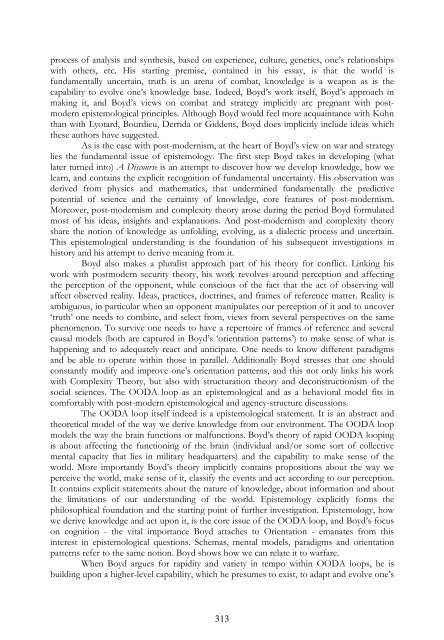Science, Strategy and War The Strategic Theory of ... - Boekje Pienter
Science, Strategy and War The Strategic Theory of ... - Boekje Pienter
Science, Strategy and War The Strategic Theory of ... - Boekje Pienter
Create successful ePaper yourself
Turn your PDF publications into a flip-book with our unique Google optimized e-Paper software.
process <strong>of</strong> analysis <strong>and</strong> synthesis, based on experience, culture, genetics, one’s relationshipswith others, etc. His starting premise, contained in his essay, is that the world isfundamentally uncertain, truth is an arena <strong>of</strong> combat, knowledge is a weapon as is thecapability to evolve one’s knowledge base. Indeed, Boyd’s work itself, Boyd’s approach inmaking it, <strong>and</strong> Boyd’s views on combat <strong>and</strong> strategy implicitly are pregnant with postmodernepistemological principles. Although Boyd would feel more acquaintance with Kuhnthan with Lyotard, Bourdieu, Derrida or Giddens, Boyd does implicitly include ideas whichthese authors have suggested.As is the case with post-modernism, at the heart <strong>of</strong> Boyd’s view on war <strong>and</strong> strategylies the fundamental issue <strong>of</strong> epistemology. <strong>The</strong> first step Boyd takes in developing (whatlater turned into) A Discourse is an attempt to discover how we develop knowledge, how welearn, <strong>and</strong> contains the explicit recognition <strong>of</strong> fundamental uncertainty. His observation wasderived from physics <strong>and</strong> mathematics, that undermined fundamentally the predictivepotential <strong>of</strong> science <strong>and</strong> the certainty <strong>of</strong> knowledge, core features <strong>of</strong> post-modernism.Moreover, post-modernism <strong>and</strong> complexity theory arose during the period Boyd formulatedmost <strong>of</strong> his ideas, insights <strong>and</strong> explanations. And post-modernism <strong>and</strong> complexity theoryshare the notion <strong>of</strong> knowledge as unfolding, evolving, as a dialectic process <strong>and</strong> uncertain.This epistemological underst<strong>and</strong>ing is the foundation <strong>of</strong> his subsequent investigations inhistory <strong>and</strong> his attempt to derive meaning from it.Boyd also makes a pluralist approach part <strong>of</strong> his theory for conflict. Linking hiswork with postmodern security theory, his work revolves around perception <strong>and</strong> affectingthe perception <strong>of</strong> the opponent, while conscious <strong>of</strong> the fact that the act <strong>of</strong> observing willaffect observed reality. Ideas, practices, doctrines, <strong>and</strong> frames <strong>of</strong> reference matter. Reality isambiguous, in particular when an opponent manipulates our perception <strong>of</strong> it <strong>and</strong> to uncover‘truth’ one needs to combine, <strong>and</strong> select from, views from several perspectives on the samephenomenon. To survive one needs to have a repertoire <strong>of</strong> frames <strong>of</strong> reference <strong>and</strong> severalcausal models (both are captured in Boyd’s ‘orientation patterns’) to make sense <strong>of</strong> what ishappening <strong>and</strong> to adequately react <strong>and</strong> anticipate. One needs to know different paradigms<strong>and</strong> be able to operate within those in parallel. Additionally Boyd stresses that one shouldconstantly modify <strong>and</strong> improve one’s orientation patterns, <strong>and</strong> this not only links his workwith Complexity <strong>The</strong>ory, but also with structuration theory <strong>and</strong> deconstructionism <strong>of</strong> thesocial sciences. <strong>The</strong> OODA loop as an epistemological <strong>and</strong> as a behavioral model fits incomfortably with post-modern epistemological <strong>and</strong> agency-structure discussions.<strong>The</strong> OODA loop itself indeed is a epistemological statement. It is an abstract <strong>and</strong>theoretical model <strong>of</strong> the way we derive knowledge from our environment. <strong>The</strong> OODA loopmodels the way the brain functions or malfunctions. Boyd’s theory <strong>of</strong> rapid OODA loopingis about affecting the functioning <strong>of</strong> the brain (individual <strong>and</strong>/or some sort <strong>of</strong> collectivemental capacity that lies in military headquarters) <strong>and</strong> the capability to make sense <strong>of</strong> theworld. More importantly Boyd’s theory implicitly contains propositions about the way weperceive the world, make sense <strong>of</strong> it, classify the events <strong>and</strong> act according to our perception.It contains explicit statements about the nature <strong>of</strong> knowledge, about information <strong>and</strong> aboutthe limitations <strong>of</strong> our underst<strong>and</strong>ing <strong>of</strong> the world. Epistemology explicitly forms thephilosophical foundation <strong>and</strong> the starting point <strong>of</strong> further investigation. Epistemology, howwe derive knowledge <strong>and</strong> act upon it, is the core issue <strong>of</strong> the OODA loop, <strong>and</strong> Boyd’s focuson cognition - the vital importance Boyd attaches to Orientation - emanates from thisinterest in epistemological questions. Schemas, mental models, paradigms <strong>and</strong> orientationpatterns refer to the same notion. Boyd shows how we can relate it to warfare.When Boyd argues for rapidity <strong>and</strong> variety in tempo within OODA loops, he isbuilding upon a higher-level capability, which he presumes to exist, to adapt <strong>and</strong> evolve one’s313
















